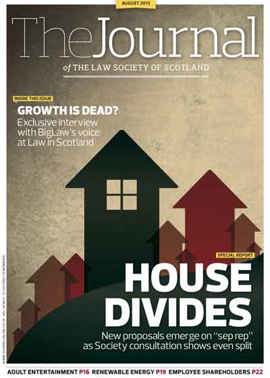Same sex marriage: for richer, for poorer

Last month (Journal, July 2013, 18), Brian Dempsey considered the proposals for legalising same sex marriage contained in the Marriage and Civil Partnership (Scotland) Bill 2013. Pensions is not a devolved issue, so to consider what effect changes in what constitutes a marriage will have on the pension rights of those entering a same sex marriage, we have to look at the UK pensions legislation.
Introduction of same sex marriages in England & Wales is at a more advanced stage than in Scotland. The Marriage (Same Sex Couples) Act 2013 received Royal Assent on 17 July, although as at the date of writing there is no date available for the coming into force of its main provisions. Importantly, it gives a spouse in a same sex marriage the same rights as a surviving civil partner, not the same rights as an opposite sex surviving spouse.
The way the Act does this is quite complicated. Rather than saying the rights afforded to those entering a same sex marriage after the Act comes into force will be the same as rights currently afforded to a couple in a civil partnership, it amends para 18 of sched 9 to the Equality Act 2010.
Discrimination challenge
At the moment, it is not discriminatory under para 18 for pension schemes to restrict access to benefits earned prior to 5 December 2005 (the date the Civil Partnership Act 2004 came into force) to surviving spouses only, i.e. a widow and widower and not the surviving civil partner. There is a duty to provide a civil partner with contracting-out rights back to 1988.
The amendments in the 2013 Act mean that schemes will be permitted to restrict access to these pre-5 December 2005 benefits to the surviving spouse of an opposite sex marriage.
Some of the provisions in the Equality Act were challenged in Walker v Innospec. Mr Walker was a member of the Innospec pension scheme, which provided for minimum statutory benefits for civil partners. He retired in 2003 and entered a civil partnership in 2006.
Mr Walker was told that the pension payable to his surviving civil partner would be £500 per annum, whereas if he was married at the time of his death, an annual pension of approximately £41,000 would have been payable to his spouse. He brought a claim against his employer and the trustees, claiming that restricting the pension payable in this way was discriminatory. The employment tribunal held that the provisions in the Equality Act 2010 did not properly implement the EU Directive, and the company and the trustees had both directly and indirectly discriminated against Mr Walker.
The decision of the ET is only binding on those involved, and we understand the case is subject to appeal. If the employment appeal tribunal confirms that of the ET, this will bind other tribunals in England and Scotland in certain circumstances, and could increase pressure to have the legislation changed.
Equality review
The Home Office previously commented that “To equalise treatment of all same sex couples in a civil partnership or marriage with that of opposite sex couples, would entail an unforeseen retrospective cost to schemes in a challenging economic climate when schemes are already under significant pressure.”
It seems the Government may have had a last minute change of heart, as s 16 in part 2 of the 2013 Act imposes an obligation on the Government to review the differences in survivors’ benefits for opposite sex and same sex couples, including considering the cost implications of equalising survivors’ benefits. The review is to be completed and a report published by 1 July 2014. Any amendments which the Government considers appropriate to reduce or eliminate inequality will be made by regulations. The laws of England & Wales and Scotland can be amended.
There will be no definitive guidance until any regulations are issued, and until then we can only speculate what the outcome of the review will be. The Government may retain the status quo, i.e. allow schemes to restrict access to pre-5 December 2005 benefits to surviving spouses of opposite sex marriages. Alternatively, it may require that same sex marriages are to be treated the same as those of opposite sex. If so, what would happen to civil partners’ benefits? Would it result in civil partners converting to same sex marriages? Another option might be for civil partners to be granted rights on an equal basis to married couples so all relationships would be equal. If schemes are to equalise benefits, this is likely to have funding implications.
In this issue
- Widening access to the stocks and gallows?
- Family migration revisited
- The same but different
- Controlling tendency
- ESPC: out of the parental home
- Offshore employment: floating goalposts?
- Reading for pleasure
- Opinion column: David O'Hagan
- Book reviews
- Profile
- President's column
- Make the most of your "multiples"
- Sep rep: all to play for
- The bigger they are...
- Licensed to thrill
- Capacity challenge
- One year, and counting?
- Selling your rights... for what?
- The voice of technology
- A serious matter
- Relocation: where are we now?
- Whistle for reform
- Same sex marriage: for richer, for poorer
- Scottish Solicitors' Discipline Tribunal
- Residential property review takes shape
- In-house lawyers seek a rising star
- Mentoring: the way forward
- How not to win business: a guide for professionals
- Comm prop risks
- Ask Ash
- Crossed purposes
- Conference looks for profession to evolve
- Law reform roundup
- Help with the red flags






